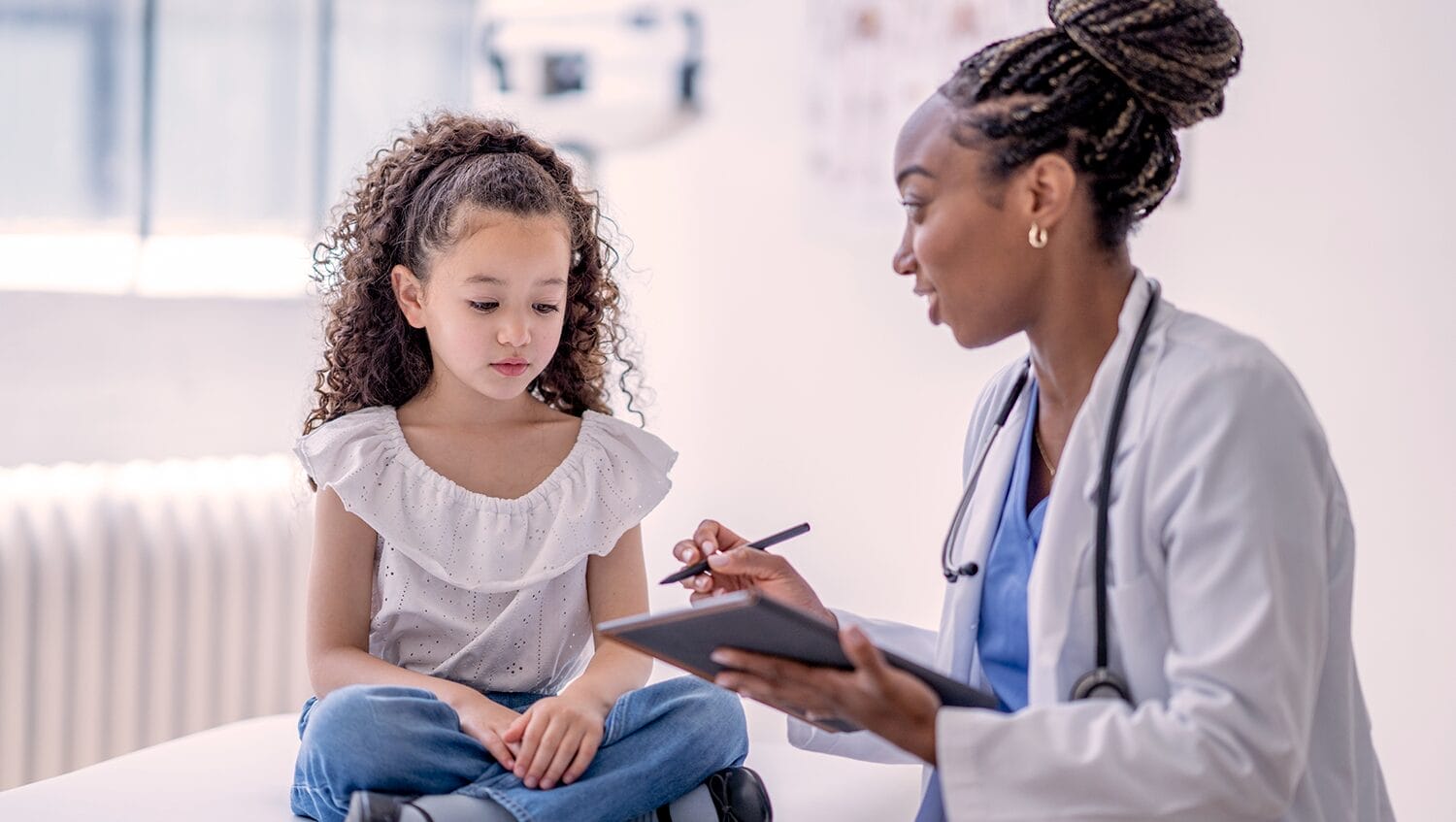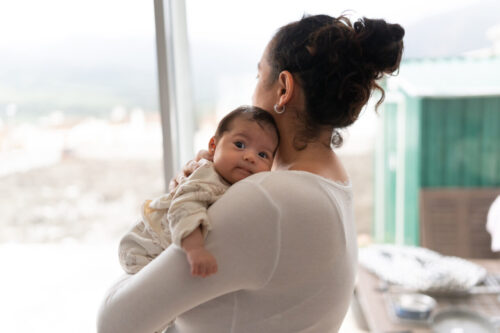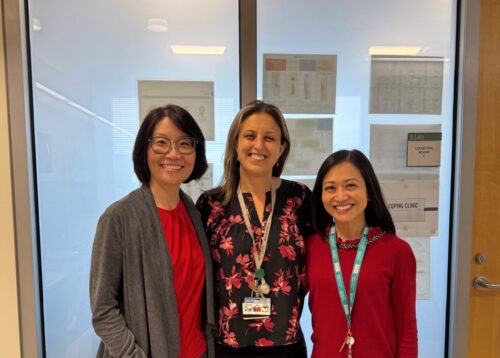New Center Will Scale Up Successful Approach to Pediatric Mental Health Care
July 31, 2024
By Meryl Bailey

Getty Images
BMC's TEAM UP model has increased screening rates, expedited access to services, and yielded positive health outcomes for children in the Boston area. And now it's expanding.
As the need for mental health services skyrockets, children are languishing on waitlists for care. Pediatric psychiatrists and psychologists are in short supply, schools lack resources, and specialized programs are shuttering. Children with anxiety, depression, and ADHD are going undiagnosed and untreated—with lifelong consequences.
Acknowledging the growing mental health crisis and the dire need for more access, Transforming and Expanding Access to Mental Health Care Universally in Pediatrics (TEAM UP) at Boston Medical Center (BMC) is reimagining the approach to mental health care. Launched in 2015, the program created a care model that integrates a behavioral health care team in the pediatric primary care setting. Over the past nine years, the model has increased screening rates, expedited access to services and yielded positive health outcomes. Working with seven community health center partners in the Boston area, TEAM UP currently serves about 40,000 children.
Thanks to new anchor funding from the Richard and Susan Smith Family Foundation and The Klarman Family Foundation, the successful model will be scaled through the TEAM UP Scaling and Sustainability Center. With the expansion, TEAM UP aims to train up to 29 new practices across Massachusetts over the next four years, expanding behavioral health care to 126,000 children. HealthCity recently interviewed the executive director of BMC’s TEAM UP Scaling and Sustainability Center Anita Morris, MSN, FNP-BC, and TEAM UP Director of Emerging Projects Emily Feinberg, ScD, CPNP, to learn more about the model’s success and the potential impact of the new center. Dr. Feinberg is also a pediatric primary care provider at DotHouse Health, a TEAM UP practice.
HealthCity: What is the biggest challenge in providing behavioral health services to children and adolescents, and how does the TEAM UP model address this challenge?
Anita Morris, MSN, FNP-BC: Even pre-pandemic, there has always been a very significant gap in access to behavioral health services for children and youth. The estimate is that about 20% of children experience some mental health need during their childhood or adolescence. That statistic is higher for particular populations—and that is pre-pandemic. There is not a robust system to address or provide services for those needs. A recent statistic is that 60% of children or adolescents who are diagnosed with major depression never receive care from a behavioral health provider. There’s a very significant paucity of appropriate services for children and adolescents. That always strikes me. Imagine anything else—if you had a child with asthma, for example—that 60% never received appropriate care. Yet, that’s standard fare for behavioral health needs for kids.
The way I describe the TEAM UP model is that it’s full spectrum. It’s intentionally designed to go from birth to young adulthood. It’s not exclusively a diagnosis-driven model. It aims to promote healthy development, identify early emerging issues, and ensure prompt access to services. With the TEAM UP model, there’s always a plan for providing services, reassessing how the child is doing, and stepping up or stepping down care if necessary.
Emily Feinberg, ScD, CPNP: I agree with Anita that the comprehensiveness of the TEAM UP model sets it apart. A three-person team, including a behavioral health clinician, a primary care provider, and a community health worker, creates a supportive environment where everyone can work to the highest level of their skillset. Integrating community health workers, specifically around pediatric mental health, is very unique. Community health workers bring cultural, linguistic, and neighborhood expertise that other clinicians do not have. Their ability to connect with parents and caregivers in a way that normalizes care and supports families to get the help they need for their children is critical.
“Integrating community health workers, specifically around pediatric mental health, is very unique. Community health workers bring cultural, linguistic, and neighborhood expertise that other clinicians do not have.”
Emily Feinberg, TEAM UP Director of Emerging Projects
The team approach also improves the overall quality of care. For example, managing connections with schools and external collaborators is extremely time-consuming. Our community health workers are so good at this. They have developed quite an expertise in the school-clinic interface. They track individualized education program (IEP) processes and ensure children are receiving the support they need. If this fell solely to a primary care provider, quite honestly, it is beyond what most clinicians could do.
HC: In what ways does the TEAM UP model specifically address equitable access to mental health care?
EF: We have thought about how the TEAM UP model can promote equitable access to services from universal screening all the way up to more specialized consultation. Having prompt access to a mental health clinician, that’s the most fundamental. Adequately staffing behavioral health teams at sites and giving that initial support so that sites have the resources to expand, train their teams, and revamp workflows is doing a lot to address unequal access. We know there are still persistent disparities in access to and engagement in developmental and behavioral services. In addition to supporting universal screening, we have worked with sites to implement new workflows that promote equitable access. For example, to ensure equitable access to early intervention services for children birth to age 3, all TEAM UP sites have developed new systems to make and track referrals to this program to ensure children get connected.
To me, universal screening is the basis for addressing inequities because if you haven’t identified the issue, you can’t treat it. Screening helps level the playing field, allowing everybody to have the opportunity to express concerns about their child’s development and for providers to see information from all of their patients rather than making assumptions based on whatever biases they might have. At TEAM UP health centers, screening happens at 92% of well child visits, as compared to the Massachusetts average of 68%.
HC: What was the impetus to create the Scaling and Sustainability Center, and what impact will it have?
AM: Through TEAM UP, we have developed a model that is sustainable, and there is an established evidence base that demonstrates its positive impact. There continues to be a great need for child mental health services across the Commonwealth, and we’re uniquely placed to respond to that need. We can meet this moment.
Our goal with creating the Center is audacious: to permanently change the expectation around access to prompt behavioral health services in the pediatric medical home. We will be certifying practices, with the goal to certify 35 TEAM UP practices across the state at the end of four years. Expanding the model this way can permanently change the starting point around what we expect behavioral health services to look like for children within the healthcare system. Instead of never seeing a provider or waiting years before receiving a proper diagnosis, there will be a shared understanding and expectation around what services need to be within primary care to ensure that kids actually have prompt access to the care they need.
“Our goal with creating the Center is audacious: to permanently change the expectation around access to prompt behavioral health services in the pediatric medical home.”
Anita Morris, executive director of BMC’s TEAM UP Scaling and Sustainability Center
We don’t expect that primary care can do 100% of everything. Our goal is that primary care handles what it is appropriately situated to do and then work with outside specialists. With the huge scarcity of child and adolescent psychiatrists, if we don’t build all of this access into primary care, we cannot optimize the scarce resources for children who need a higher level of care.
EF: I’ve been a researcher and a clinician for many years. What is unique about this program and the new center is the ability to take a really underdeveloped, aspirational idea, co-develop it with a team of health centers, implement it, study it and now take it more broadly to scale. This is a very rare opportunity and one in which we thank the funders profoundly for providing anchor funding to create the new center, and for their wisdom in recognizing that making true change takes time. Thanks to their vision and support, we have time and resources to spread our impact, build momentum, and forge additional partnerships with supporters who want to make a meaningful difference in the lives of children.
*This interview has been edited and condensed for clarity and length.


